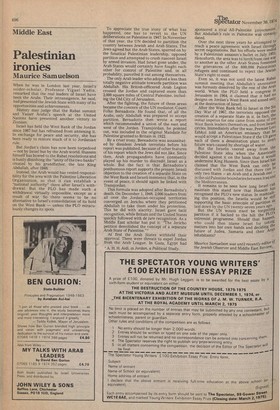Palestinian ironies
Maurice Samuelson
When he was in London last year, Israel's solder-scholar, Professor Yigael Yadin, remarked that the real leaders of Israel have been the Arabs. Their intransigence, he said, had presented the Jewish State with many of its opportunities and achievements.
History may judge that the Rabat summit and Yasser Arafat's speech at the United Nations have presented another victory to Zionism.
Israel has held the West Bank of the Jordan since 1967 but has refrained from annexing it. In exchange for peace and security, she has been ready to restore much of it to Jordanian rule.
But Jordan's claim has now been torpedoed — not by Israel but by the Arab world. Hussein himself has bowed to the Rabat resolutions and is busily dissolving the "unity of the two banks" created by his grandfather, the late King Abdullah, after 1948.
Instead, the Arab would has vested responsibility for the area with the Palestine Liberation Organisation, so that it can establish a "national authority" there after Israel's withdrawal. But the PLO has made such a withdrawal virtually impossible, except as a result of war. So there seems to be no alternative to Israel's consolidation of its hold on the West Bank — unless the PLO miraculously changes its spots. To appreciate the true irony of what has happened, one has to revert to the UN deliberations on Palestine in 1947. In November of that year, the UN decided to partition the country between Jewish and Arab States. The Jews agreed but the Arab States, spurred on by the fanatical Palestinian leadership, opposed partition and attempted to crush nascent Israel by armed invasion. Had Israel gone under, the Arab States would certainly have fought each other for control of Palestine and, in all probability, parcelled it out among themselves.
The only Arab leader who adopted a less than totally negative attitude towards partition was Abdullah. His British-officered Arab Legion crossed the Jordan and captured more than 2,000 square miles of Central Palestine, including the Old City of Jerusalem.
After the fighting, the future of these areas became the concern of the UN mediator, Count Folke Bernadotte. He found that, of all the Arabs, only Abdullah was prepared to accept partition. Bernadotte then wrote a report which recommended a union of the east and west of the Jordan. Transjordan, he pointed out, was included in the original Mandate for Palestine granted to Britain in 1922.
By a cruel irony, Bernadotte was assassinated by dissident Jewish terrorists before his report was published, because of other features of his report which the Jews did not like. Since then, Arab propagandists have constantly played up his murder to discredit Israel as a whole. But the fact is that Bernadotte's posthumous report supports the present Israeli objection to the creation of a separate State on the West Bank and Israeli insistence that, in the event of peace, it should again be linked with Transjordan.
This formula was adopted after Bernadotte's death. On December 1, 1948, 2,000 leaders from all over the Jordanian-occupied territories converged on Jericho where they petitioned Abdullah to take them under his protection.
This he did with alacrity. Israel gave tacit recognition, while Britain and the United States quickly followed with de lure recognition. As a Middle East scholar has put it: "The Jericho petition demolished the concept of a separate Arab State of Palestine."* At first the Arab States withheld their approval. There were threats to expel Jordan from the Arab League. In Gaza, Egypt had *A. H. H. Aidi, in Jordan, a Political Study.
sponsored a rival All-Palestine government. But Abdullah's rule in Palestine was cons dated. Over the next three years he attempted to reach a peace agreement with Israel through secret negotiations. But his efforts were ended by a Palestinian assassin's bullet in July 1951. Henceforth, the area was to lurch from one war to another as the other Arab States fomented the grievances of the 600,000 Palestinian refugees and continued to reject the Jewish State's right to exist. Even so, it was not until the latest Rabat summit meeting that Abdullah's annexation was formally dissolved by the rest of the Arab world. When the PLO held a congress VI Jerusalem in 1964, it claimed that it had no designs on Jordan's West Bank and aimed only at the destruction of Israel. After the West Bank fell to Israel in the Six Day War of 1967, the terrorists opposed the creation of a separate State in it. In fact, the initial impetus for one came from some ofthe West Bank leaders themselves, and from Israel" circles. Immediately after the war, Premier Levi Eshkol told an American emissary that be would accept a Palestinian State if the US gave each of them a desalination plant to avert future wars caused by shortage of water. But the Israelis veered away from to` Palestine State idea when the Americans, decided against it on the basis that it Woula undermine King Hussein. Since then Israel has claimed that the West Bank can only be, discussed with Jordan and that there can be only two States — an Arab and a Jewish one `d in the old Palestine boundaries between Iraq an the Mediterranean. It remains to be seen how long Israel earl maintain this stand now that Hussein has recognised the PLO's new status. In maintain,; ing this position, the Israelis would be 01,1 supporting the basic principle of partition a5 laid down by the UN twenty-seven years ag°. parBtuittiontheif UN hawc koeudi (I to' t st he Iet hiltb be ttohregeptiLtion,ngs extremist programme. Should that haPPewho could then blame Israel for takirl,ge matters into her own hands and deciding tn,.. future of Judea, Samaria and their Ara' inhabitants?
Maurice Samuelson was until recently editor of
the Jewish Observer and Middle East Review










































 Previous page
Previous page